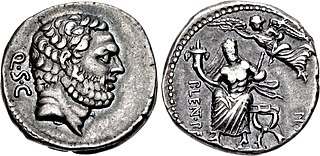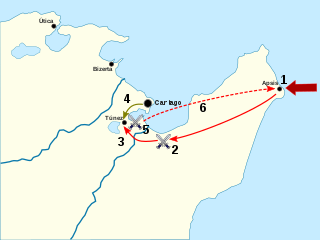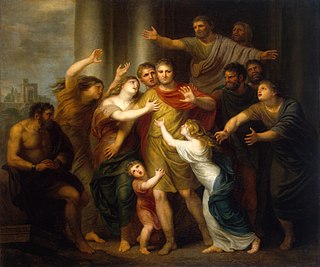Related Research Articles

The gens Valeria was a patrician family at ancient Rome, prominent from the very beginning of the Republic to the latest period of the Empire. Publius Valerius Poplicola was one of the consuls in 509 BC, the year that saw the overthrow of the Tarquins, and the members of his family were among the most celebrated statesmen and generals at the beginning of the Republic. Over the next ten centuries, few gentes produced as many distinguished men, and at every period the name of Valerius was constantly to be found in the lists of annual magistrates, and held in the highest honour. Several of the emperors claimed descent from the Valerii, whose name they bore as part of their official nomenclature.

The Battle of Lake Trasimene was fought when a Carthaginian force under Hannibal Barca ambushed a Roman army commanded by Gaius Flaminius on 21 June 217 BC, during the Second Punic War. The battle took place on the north shore of Lake Trasimene, to the south of Cortona, and resulted in a heavy defeat for the Romans.

Publius Cornelius Lentulus Spinther was a Roman politician and general. Hailing from the patrician family of the Cornelii, he helped suppress the Catilinarian conspiracy during his term as curule aedile in 63 BC and later served as consul in 57 BC. Denied the opportunity to invade Egypt the following year, he nevertheless won some victories in his province of Cilicia and celebrated a triumph over it in 51 BC.
Aulus Atilius Caiatinus was a Roman general and statesman who achieved prominence for his military activities during the First Punic War against Carthage. As consul in 258 BC, he enjoyed several successes in Sicily, for which he later celebrated a triumph. He undertook further campaigning in Sicily both at sea and on land during a second consulship and then as dictator, becoming the first Roman dictator to lead an army outside mainland Italy.

The gens Aurelia was a plebeian family at ancient Rome, which flourished from the third century BC to the latest period of the Empire. The first of the Aurelian gens to obtain the consulship was Gaius Aurelius Cotta in 252 BC. From then to the end of the Republic, the Aurelii supplied many distinguished statesmen, before entering a period of relative obscurity under the early emperors. In the latter part of the first century, a family of the Aurelii rose to prominence, obtaining patrician status, and eventually the throne itself. A series of emperors belonged to this family, through birth or adoption, including Marcus Aurelius and the members of the Severan dynasty.

The Battle of the Bagradas River, also known as the Battle of Tunis, was a victory by a Carthaginian army led by Xanthippus over a Roman army led by Marcus Atilius Regulus in the spring of 255 BC, nine years into the First Punic War. The previous year, the newly constructed Roman navy established naval superiority over Carthage. The Romans used this advantage to invade Carthage's homeland, which roughly aligned with modern-day Tunisia in North Africa. After landing on the Cape Bon Peninsula and conducting a successful campaign, the fleet returned to Sicily, leaving Regulus with 15,500 men to hold the lodgement in Africa over the winter.
The ovation was a lesser form of the Roman triumph. Ovations were granted when war was not declared between enemies on the level of nations or states; when an enemy was considered basely inferior ; or when the general conflict was resolved with little or no danger to the army itself. The Ovation could also be given rather than a triumph when there were extenuating circumstances, such as when Marcus Marcellus was given an ovation in lieu of a triumph as his army remained in Sicily and therefore was unable to cross the pomerium.

Marcus Atilius Regulus was a Roman statesman and general who was a consul of the Roman Republic in 267 BC and 256 BC. Much of his career was spent fighting the Carthaginians during the first Punic War. In 256 BC, he and Lucius Manlius Vulso Longus defeated the Carthaginians at the naval battle off Cape Ecnomus; afterwards he led the Roman expedition to Africa but was defeated at the Bagradas River in spring of 255 BC. He was captured and then probably died of natural causes.
Gnaeus Servilius Geminus was a Roman consul, serving as both general and admiral of Roman forces, during the Second Punic War.

The gens Memmia was a plebeian family at ancient Rome. The first member of the gens to achieve prominence was Gaius Memmius Gallus, praetor in 172 BC. From the period of the Jugurthine War to the age of Augustus they contributed numerous tribunes to the Republic.
Marcus Aurelius Cotta was a Roman politician and general who was consul in 74 BC. He was posted to Bithynia with a Roman fleet as part of the Third Mithridatic War. He was defeated by King Mithridates VI of Pontus. Rescued by his fellow consul he reduced the Pontic coast and captured the city of Heraclea after a two-year siege. Returning to Rome in 70 BC, Cotta was acclaimed for his victory. However, around 67 BC he was convicted of the misappropriation of war booty and expelled from the Senate, a signal mark of disgrace.
Publius Cornelius Scipio Asina was a Roman politician and general who served as consul in 221 BC, and as such campaigned against the Histri, a people in the northern Adriatic. Asina belonged to the Scipionic-Aemilian faction which dominated Roman politics at the beginning of the Second Punic War, and advocated for an aggressive policy against Hannibal. This stance led him to oppose the more prudent strategy of Fabius Maximus. He was notably appointed Interrex in 216 BC, probably in order to manipulate the elections.
Lucius Aurelius Cotta was a Roman Senator and military commander who was elected Roman consul in 119 BC.
The gens Rutilia was a plebeian family at ancient Rome. Members of this gens appear in history beginning in the second century BC. The first to obtain the consulship was Publius Rutilius Rufus in 105 BC.
The gens Manilia was a plebeian family at ancient Rome. Members of this gens are frequently confused with the Manlii, Mallii, and Mamilii. Several of the Manilii were distinguished in the service of the Republic, with Manius Manilius obtaining the consulship in 149 BC; but the family itself remained small and relatively unimportant.
Titus Veturius Geminus Cicurinus was a Roman politician of the 5th century BC, consul in 462 BC and maybe decemvir in 451 BC.
Lucius Lucretius Tricipitinus was a Roman senator in the fifth century BC, and was consul with Titus Veturius Geminus Cicurinus in 462 BC.
The siege of Heraclea was a military investment of the city of Heraclea Pontica during the Third Mithridatic War. The siege was conducted by the Roman proconsul Marcus Aurelius Cotta and the legate Gaius Valerius Triarius. They were besieging the adherents of Mithridates of Pontus, who held the city for the Pontic king. Heraclea was located on the strategically important northern land route into the kingdom of Pontus and had been taken and garrisoned by Mithridates on his retreat from the Siege of Cyzicus. The 4,000-man strong Mithridatic garrisoned was commanded by Connacorex, one of the king's generals, and held out for almost two years. After taking Heraclea, the Romans plundered the city extensively.
Gaius Aurelius Cotta was a Roman statesman and general during the middle era of the Roman Republic. He was one of the two consuls of 252 BC, serving with Publius Servilius Geminus; both consuls carried on the war in Sicily against the Carthaginians with great success. Among several other places they also took Himera, but its inhabitants had been secretly removed by the Carthaginians. Afterwards Cotta borrowed ships from Hiero, and having united them with the remnants of the Roman fleet, he sailed to Lipara, the blockade of which he left to his tribune, Quintus Cassius, with the express order not to engage in a battle; but, during the absence of the consul, Cassius notwithstanding allowed himself to be drawn into an engagement, in which many Romans were killed. On being informed of this Cotta returned to Lipara, besieged and took the town, put its inhabitants to the sword, and deprived Cassius of his office of tribune. Cotta was celebrated for the strict discipline which he maintained among his troops, and of which several instances are on record. During the siege of Lipara one of his own kinsmen, Publius Aurelius Pecuniola, was scourged and degraded to the rank of a common soldier, because through his fault a part of the camp was set on fire, in consequence of which almost the whole camp fell into the hands of the enemy. It was probably during the same campaign, that he acted with great rigour towards the equites who refused to obey his commands. At the close of his consulship Cotta triumphed over the Carthaginians and Sicilians. In 248 he obtained the consulship a second time, together with his former colleague, Servilius Geminus, and again fought in Sicily against the Carthaginians. Carthalo in vain endeavoured to make a diversion by attacking the coasts of Italy.
Gaius Furius Pacilus was a Roman statesman and general during the middle era of the Roman Republic. He was one of the two consuls of 251 BCE, serving with Lucius Caecilius Metellus. They fought against the Carthaginians in the ongoing First Punic War. They campaigned in Sicily, but achieved little.